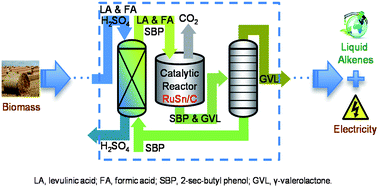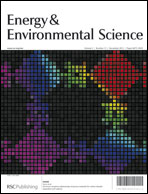A sulfuric acid management strategy for the production of liquid hydrocarbon fuels via catalytic conversion of biomass-derived levulinic acid†
Abstract
In this study, we first develop an integrated strategy for the catalytic conversion of lignocellulose into liquid fuels based on the production of levulinic acid (LA) followed by its hydrogenation to γ-valerolactone (GVL). Our integrated strategy involves a novel catalytic conversion process employing alkylphenol-based separation to extract LA from the sulfuric acid containing aqueous solution following the sulfuric acid catalyzed deconstruction of cellulose. To minimize utility consumption, we perform heat integration, while the remaining heating requirement is satisfied by the combustion of residual biomass. Hot combustion gases are also used to generate electricity, which meets the electricity requirement of the process, while the excess electricity is sold to the grid. We perform a technoeconomic analysis for the alkylphenol-based strategy and compare its economics with a previously reported strategy, in which butyl acetate was used as an extractive solvent to separate GVL from sulfuric acid following the LA hydrogenation step. With some improvements in the process configuration, the alkylphenol strategy leads to a minimum selling price (MSP) of $4.40 per gallon of gasoline equivalent (GGE) for compatible biofuel components, whereas the butyl acetate strategy leads to a MSP of $4.68 per GGE. We show that the alkylphenol strategy becomes a significantly better choice when the catalyst lifetime for the hydrogenation of LA becomes less than 6 months.


 Please wait while we load your content...
Please wait while we load your content...